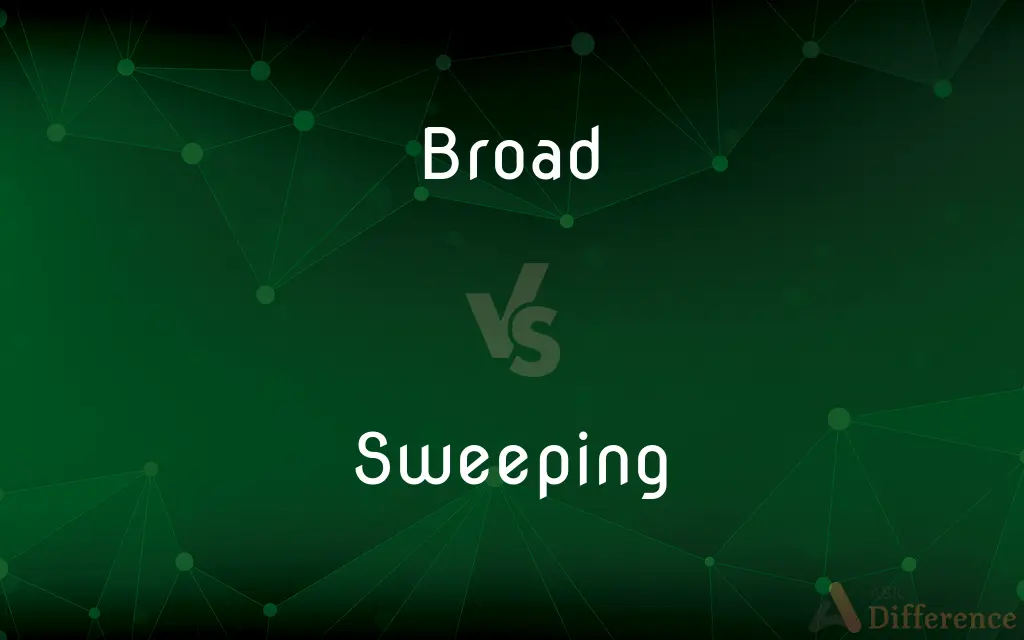Broad vs. Sweeping — What's the Difference?
Edited by Tayyaba Rehman — By Fiza Rafique — Published on December 14, 2024
Broad describes a wide scope or range, focusing on inclusivity, while sweeping implies a wide-ranging effect, often suggesting thoroughness or drastic impact.

Difference Between Broad and Sweeping
Table of Contents
ADVERTISEMENT
Key Differences
Broad refers to a wide scope or range, emphasizing inclusivity and diversity in its application. It is often used to describe general concepts, categories, or physical dimensions that encompass a large variety. On the other hand, sweeping usually implies a wide-ranging effect or coverage, often suggesting thoroughness, drastic impact, or comprehensive changes. This term is frequently used to describe actions, statements, or policies that affect many aspects or areas at once.
While "broad" can apply to physical spaces, concepts, or classifications, indicating extensiveness in width, range, or diversity, "sweeping" often conveys actions or changes that span broadly but with the added connotation of being all-encompassing or radical. Sweeping changes or statements might not only cover a broad area but also imply a significant, sometimes sudden, impact.
The use of "broad" often focuses on the aspect of coverage without necessarily implying a judgment on the depth or impact of that coverage. For example, a broad study might cover many topics or areas but not delve deeply into any single one. Whereas "sweeping" suggests not just coverage but also a strong, often transformative effect, as in sweeping reforms that radically change the landscape of an issue.
In terms of specificity, "broad" might be used to describe a general approach or category that includes many possibilities without focusing on the specifics. It allows for a wide range of diversity within its scope. In contrast, "sweeping" could be seen as more targeted in its application, despite its wide reach, because it often aims at specific changes or effects that are meant to be comprehensive and impactful.
Ultimately, while both "broad" and "sweeping" describe wide scopes or effects, the key difference lies in their implications and contexts of use. "Broad" emphasizes inclusivity and extensiveness without necessarily indicating a deep impact, while "sweeping" conveys a sense of thorough, often radical, change or impact across a wide area.
ADVERTISEMENT
Comparison Chart
Definition
Wide in scope or range, emphasizing inclusivity and diversity
Implies a wide-ranging effect, suggesting thoroughness
Usage
Describes concepts, dimensions, classifications
Used for actions, statements, policies with broad effects
Connotation
Inclusiveness, diversity, extensiveness
Comprehensive changes, significant impact
Focus
Coverage and diversity without depth specificity
Targeted, impactful changes despite broad coverage
Examples
Broad spectrum of ideas, broad categories
Sweeping reforms, sweeping statements
Compare with Definitions
Broad
Wide scope or range
The museum offers a broad array of art from different cultures.
Sweeping
Thoroughness or drastic impact
The CEO announced sweeping cuts to the workforce.
Broad
Inclusivity and diversity
The study takes a broad approach to examining social dynamics.
Sweeping
Wide-ranging effect
The new law introduced sweeping changes to the healthcare system.
Broad
General concepts or categories
She has broad interests ranging from science to literature.
Sweeping
Comprehensive changes
The reform outlined sweeping improvements in public services.
Broad
Extensive coverage
His broad knowledge of history is impressive.
Sweeping
Significant, sometimes sudden, impact
The crisis prompted sweeping adjustments across the industry.
Broad
Physical dimensions
The broad river is navigable for large ships.
Sweeping
All-encompassing coverage
The documentary provides a sweeping overview of the environmental challenges.
Broad
Wide in extent from side to side
A broad river.
Broad shoulders.
Sweeping
Having wide-ranging influence or effect
Sweeping changes.
Broad
Large in expanse; spacious
A broad lawn.
Sweeping
Moving in or as if in a wide curve
A sweeping gesture.
A sweeping glance.
Broad
Having a certain width from side to side
A sidewalk three feet broad.
Sweeping
Wide, broad, affecting or touching upon many things.
The government will bring in sweeping changes to the income tax system.
Broad
Extended, in the sense of diffused; open; clear; full.
Sweeping
Having broad range or effect;
Had extensive press coverage
Far-reaching changes in the social structure
Sweeping reforms
Broad
Having a large measure of any thing or quality; unlimited; unrestrained.
Broad
Extending far and wide; extensive; vast; as, the broad expanse of ocean.
Broad
Fig.: Having a large measure of any thing or quality; not limited; not restrained; - applied to any subject, and retaining the literal idea more or less clearly, the precise meaning depending largely on the substantive.
A broad mixture of falsehood.
Broad
The broad part of anything; as, the broad of an oar.
Common Curiosities
Why use "broad" to describe concepts or categories?
"Broad" is used for concepts or categories to indicate a wide variety of included elements without specifying details.
How does "sweeping" differ from "broad"?
"Sweeping" suggests a wide-ranging effect with thoroughness or drastic impact, unlike "broad" which focuses on inclusivity and extensiveness.
Can "broad" apply to physical spaces?
Yes, "broad" can describe physical dimensions, like a broad plain or a broad street, indicating extensiveness in width.
What makes an action "sweeping"?
An action is "sweeping" if it has a wide-ranging and comprehensive effect, often bringing about substantial changes or reforms.
Can something be both broad and sweeping?
Yes, an action or policy can be both broad in scope and sweeping in its impact, covering many areas with significant changes.
What does "sweeping changes" mean?
"Sweeping changes" refer to comprehensive and significant alterations that affect many aspects of a subject or system.
Is "broad" or "sweeping" more impactful?
"Sweeping" often carries a connotation of more significant impact, especially in terms of changes or reforms, compared to "broad."
What does "broad" typically imply?
"Broad" implies a wide scope or range, emphasizing inclusivity and diversity.
Are "sweeping" reforms always positive?
"Sweeping" reforms are not inherently positive or negative; the impact depends on the context and perspective.
Can the term "broad" be used in a negative context?
While generally neutral, "broad" can be seen negatively if it implies a lack of focus or detail.
How does "sweeping" relate to change?
"Sweeping" is closely related to change, indicating comprehensive and often radical transformations.
How does context affect the use of "broad" and "sweeping"?
The context determines whether the emphasis is on the inclusivity and diversity of coverage ("broad") or the comprehensive impact and thoroughness of an action ("sweeping").
Does "broad" imply superficiality?
Not necessarily. While "broad" indicates a wide scope, it doesn't inherently suggest a lack of depth, just a wide range of coverage.
What is an example of a "broad" study?
A "broad" study might explore a wide range of topics within a field without delving deeply into any single topic.
Is there a way to measure if something is "broad" or "sweeping"?
Measurement is subjective, based on the scope of coverage for "broad" and the extent and impact of changes for "sweeping."
Share Your Discovery

Previous Comparison
Indoor Air Conditioner vs. Outdoor Air Conditioner
Next Comparison
I-9 Form vs. W-9 FormAuthor Spotlight
Written by
Fiza RafiqueFiza Rafique is a skilled content writer at AskDifference.com, where she meticulously refines and enhances written pieces. Drawing from her vast editorial expertise, Fiza ensures clarity, accuracy, and precision in every article. Passionate about language, she continually seeks to elevate the quality of content for readers worldwide.
Edited by
Tayyaba RehmanTayyaba Rehman is a distinguished writer, currently serving as a primary contributor to askdifference.com. As a researcher in semantics and etymology, Tayyaba's passion for the complexity of languages and their distinctions has found a perfect home on the platform. Tayyaba delves into the intricacies of language, distinguishing between commonly confused words and phrases, thereby providing clarity for readers worldwide.













































